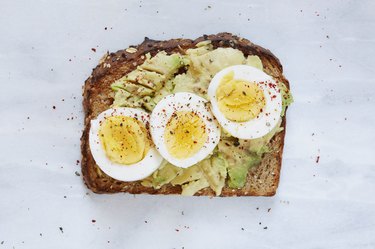
Swelling in the legs, known as edema, does not always point to a serious condition. However, it's a symptom that shouldn't go ignored. While injury, inflammation and certain diseases can cause leg swelling, there are also certain foods that cause edema.
What Is Edema?
Video of the Day
Edema is swelling that occurs when fluid is trapped in your body's tissues, according to the Cleveland Clinic. The swelling and puffiness typically occurs in your feet, ankles and legs, but it can also involves other parts of the body, such as the face and hands.
Video of the Day
If you notice these symptoms and/or stretched or shiny skin, or swelling in the abdomen, then you should make an appointment to see your doctor. Seek immediate care if you notice these symptoms coupled with shortness of breath, difficulty breathing and/or chest pain.
There are myriad factors that can lead to edema, ranging from something as simple as sitting for too long to medications you may be taking for blood pressure or pain management, according to the Cleveland Clinic. There are also certain foods that cause edema, whether it be the result of ingesting too much salt or food allergies that cause leg swelling.
Foods That Can Cause Edema
If you notice your legs swell after eating, then you might be dealing with food-related edema. This sudden reaction — known as angioedema — is most often caused by one or more of the top food allergens: cow's milk, eggs, fish, peanuts, shellfish, soy, tree nuts and wheat.
When angioedema occurs, you may notice that leg swelling is coupled with swelling in other areas of the body, including the eyes, lips, face and even throat. This reaction — known as anaphylaxis — can be coupled with a skin rash, nausea and difficult breathing. Anaphylaxis is life-threatening and requires immediate care, including the administration of epinephrine (EpiPen).
Edema Diet Plan
If you suspect certain foods are at the root of your edema, then the American Academy of Allergy Asthma & Immunology maintains that you will need to see an allergist or immunologist to diagnose and help manage your condition. Once you know what foods may be causing swelling and puffiness, your health care provider may suggest an edema diet plan that will help pinpoint problematic foods.
This could include eliminating the top suspected food allergens, as well as eating foods high in vitamin B and iron, such as dark leafy greens and sea vegetables, according to St. Luke's Hospital. Natural diuretic vegetables, like asparagus, beets, pineapple, pumpkin and garlic may also help flush out swelling. The hospital also recommends:
- Eating antioxidant-rich foods, like blueberries, cherries and tomatoes.
- Eliminating refined and processed foods, such as white bread, sugar, cookies and crackers.
- Choosing lean meats — such as cold-water fish and chicken breast — for protein, instead of red meat.
- Opting for healthy cooking oils, like olive oil.
- Limiting consumption of alcohol and tobacco.
Taking these steps will also decrease swelling that is the result of too much salt intake, so you should keep sodium consumption in check if you are experiencing edema.It's important to note that even with these steps, you will need to work closely with a health care professional who can advise you on how to combine lifestyle and dietary changes with a medication, such as a diuretic, that may be prescribed to reduce symptoms of edema.
Is this an emergency? If you are experiencing serious medical symptoms, please see the National Library of Medicine’s list of signs you need emergency medical attention or call 911.